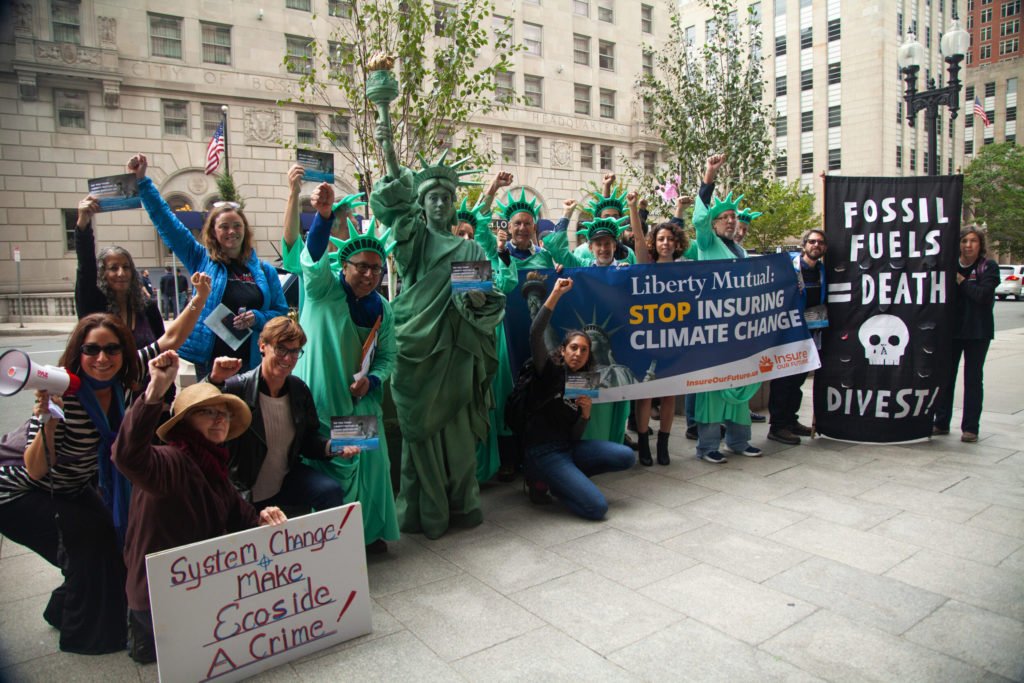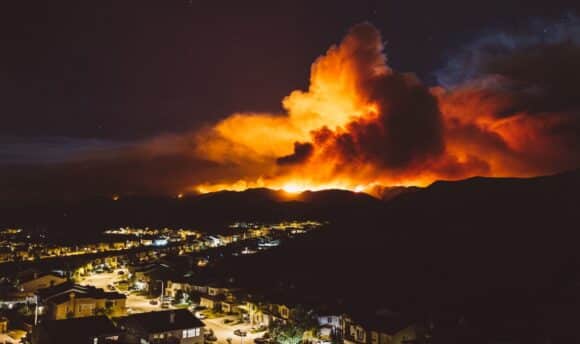A coalition of climate justice organizations is targeting Liberty Mutual for underwriting fossil fuels
By ELANA SULAKSHANA & TAMARA TOLES O’LAUGHLIN

The following article was published on April 20 at RollingStone.com.
Climate and social justice advocates have long worked to connect the dots between flows of big money and the main players propping up the fossil fuel economy. As the climate movement pulls at the threads of old power structures, it’s found that the villains of the climate crisis are a wider network than you might imagine. Surprisingly, one of the biggest culprits guilty of accelerating the climate crisis is an often overlooked part of our daily lives: Big Insurance.
The pandemic is teaching us precisely what happens when we ignore the demands of reality and science and do not take swift action to curb a crisis before it is full blown. We must act now to put measures in place to halt catastrophic climate and health impacts — and that means tackling the very corporations who continue to profit at the expense of people and planet.
Big Oil, Big Money, and Big Insurance form an unholy alliance that prop up the fossil fuel economy. For too long, insurance companies have hidden behind charismatic cartoon logos and funny campaigns to escape the scrutiny they deserve for acting as central players in facilitating fossil fuel expansion. We call bullshit. And we aren’t the only ones. A rapidly growing international movement is rising to hold insurance companies accountable, and in the U.S. our first clear target is Liberty Mutual.
Liberty Mutual is providing essential insurance to fossil fuel infrastructure giant TC Energy to enable construction of the dangerous Keystone XL (KXL) pipeline, which would carry extracted tar sands oil from Alberta, Canada to the U.S. Already, Liberty Mutual has provided a $15.6 million bond to cover the risks related to the construction of KXL through South Dakota.
Against all reason, the government of Alberta, Canada recently greenlit a $1.1 billion investment and $4.2 billion in additional loans for TC Energy to build the Keystone XL pipeline, a project hundreds of thousands of people have fought for a decade as a matter of life and death. To top it off, Gov. Steve Bullock of Montana approved construction of the project through the state later this month, despite an extended stay-at-home order being in place to fight the spread of coronavirus. As evidence of how volatile the fight over KXL remains, just last week a federal judge revoked a key environmental permit needed to build the pipeline. The judge ruled that the fast-tracked process had not properly assessed the project’s impacts on endangered species.
Keystone XL, a bad idea to begin with, multiplies the threat of coronavirus. With no irony, construction has been deemed “essential work” and workers are being brought into already vulnerable local communities. Prioritizing this kind of infrastructure is a risk that could send hundreds of new vectors of infection to Indigenous, rural, and farming communities along the pipeline route. These communities are already faced with the triple threat of a doomed project that threatens their water, land, and way of life. The continued spread of coronavirus — and the tragic fact that pipeline construction in the U.S. is well documented to create a direct increase in violence against Indigenous women at the hands of transient workers brought in to live in temporary “man camps” built for construction workers along the route — is reason enough to halt it altogether.
Energy companies must purchase insurance policies to cover the costs of liabilities if anything goes wrong during development, construction, or operation. Yet what a paradox it is that Liberty Mutual, supposedly an expert in risk assessment, will insure a dirty pipeline like Keystone that is marred in legal obstructions, while ignoring the short and long term public health risks that pose grave harms to workers and nearby communities.
Insuring KXL also misses the economic mark; the market value of tar sands oil is plunging as we hurl toward a recession. The price of Alberta’s tar sands dropped to $5 per barrel as of this writing. That makes a tar sands oil barrel cheaper than a 10-pack of toilet paper or a gallon of hot sauce; it also makes it more likely that new construction of KXL and other tar sands pipelines like Line 3 in Minnesota and Trans Mountain in Canada will be stranded assets very soon after they’re built.
Following a groundswell of grassroots pressure, Liberty Mutual adopted a policy restricting insurance for some coal companies in 2019, but the company continues to insure oil and gas with no restrictions and to invest billions in fossil fuels. At the same time, it is abandoning homeowners and farmers on the margins of climate change. The insurance industry is actively redlining large areas where people are experiencing the most severe impacts of climate change, including in wildfire-affected counties in California. In recent years, a Liberty Mutual spokesperson referred to dropping policies and raising rates as a “necessary step to responsibly manage our overall exposure to wildfires.”
Rather than exploit the earth for the last drops of profit at the expense of the people and the health and safety of communities and workers along pipeline routes, Liberty Mutual should stop underwriting the fossil fuel sector entirely and invest in the future we’re fighting for. With a rampant public health crisis on our hands and the global economy crashing, now is the time for insurance companies and banks to change the way they do things. We are calling on Liberty Mutual, and all insurance companies to halt their investments in dirty projects, and instead invest in the expansion and development of renewable infrastructure and public programs that prioritize the care and repair of communities made vulnerable by fossil fuel investments. These are the ways to repair harm.
Stop the Money Pipeline coalition, an unprecedented partnership uniting nearly 100 local and national youth, Indigenous, environmental, and climate justice organizations, has identified three primary financial sector actors as top priority targets: megabank JPMorgan Chase (the Doomsday Bank, as Bill McKibben called it in Rolling Stone), behemoth asset manager Blackrock, and Liberty Mutual. Nearly 100,000 people have signed onto a petition calling on Liberty Mutual to stop taking part in enabling support for the tar sands industry.
Before the pandemic hit, the Stop the Money Pipeline coalition had planned hundreds of coordinated, distributed direct actions against the finance sector’s role in driving the climate crisis, to take place during this week’s 50th anniversary of Earth Day. To avoid in-person gatherings, the coalition has now joined forces with Earth Day Live for three days of digital actions. Thursday, April 23rd, will be Stop the Money Pipeline Live, where activists, experts, politicians and celebrities will educate on these issues and offer opportunities to take action against the largest funders of climate chaos, including Liberty Mutual.
It’s time for insurers to stop acting as validators for a dying industry and to invest instead in our communities. We need a livable economy, powered by renewable energy and real climate leadership. Now more than ever is the time to demand the world we deserve. We hope that you will join us in building accountability and pressuring corporations to stop operating business as usual. We must summon the moral clarity to demand what is necessary in this moment from government and fossil fuel enablers as the compound crises of COVID-19 and the climate crisis change our trajectory forever.
Elana Sulakshana leads the Rainforest Action Network’s campaign to stop the U.S. insurance industry from driving the climate crisis.
Tamara Toles O’Laughlin is the North America director for the global climate campaign 350.org.



